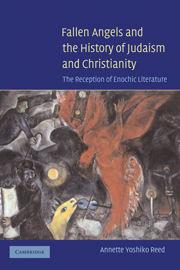Book contents
- Frontmatter
- Contents
- Preface
- List of Abbreviations
- Fallen Angels and the History of Judaism and Christianity
- Introduction
- 1 Angelic Descent and Apocalyptic Epistemology: The Teachings of Enoch and the Fallen Angels in the Book of the Watchers
- 2 From Scribalism to Sectarianism: The Angelic Descent Myth and the Social Settings of Enochic Pseudepigraphy
- 3 Primeval History and the Problem of Evil: Genesis, the Book of the Watchers, and the Fallen Angels in Pre-Rabbinic Judaism
- 4 The Parting of the Ways? Enoch and the Fallen Angels in Rabbinic Judaism and Early Christianity
- 5 Demonology and the Construction of Christian Identity: Approaches to Illicit Angelic Instruction among Proto-Orthodox Christians
- 6 The Interpenetration of Jewish and Christian Traditions: The Exegesis of Genesis and the Marginalization of Enochic Literature
- 7 The Apocalyptic Roots of Merkabah Mysticism? The Reemergence of Enochic Traditions in Rabbinic Judaism
- Epilogue
- Bibliography
- Index of Modern Authors
- Index of Primary Sources
- Subject Index
5 - Demonology and the Construction of Christian Identity: Approaches to Illicit Angelic Instruction among Proto-Orthodox Christians
Published online by Cambridge University Press: 17 August 2009
- Frontmatter
- Contents
- Preface
- List of Abbreviations
- Fallen Angels and the History of Judaism and Christianity
- Introduction
- 1 Angelic Descent and Apocalyptic Epistemology: The Teachings of Enoch and the Fallen Angels in the Book of the Watchers
- 2 From Scribalism to Sectarianism: The Angelic Descent Myth and the Social Settings of Enochic Pseudepigraphy
- 3 Primeval History and the Problem of Evil: Genesis, the Book of the Watchers, and the Fallen Angels in Pre-Rabbinic Judaism
- 4 The Parting of the Ways? Enoch and the Fallen Angels in Rabbinic Judaism and Early Christianity
- 5 Demonology and the Construction of Christian Identity: Approaches to Illicit Angelic Instruction among Proto-Orthodox Christians
- 6 The Interpenetration of Jewish and Christian Traditions: The Exegesis of Genesis and the Marginalization of Enochic Literature
- 7 The Apocalyptic Roots of Merkabah Mysticism? The Reemergence of Enochic Traditions in Rabbinic Judaism
- Epilogue
- Bibliography
- Index of Modern Authors
- Index of Primary Sources
- Subject Index
Summary
THE PREVIOUS CHAPTER EXPLORED THREE FACETS OF THE PROTO-orthodox Christian relationship with Judaism: continuities with pre-Rabbinic Judaism, parallels with the emergent Rabbinic movement, and efforts to delineate an identity distinct from “the Jews.” This, of course, forms only half of the story of the construction of a Christian collective identity in the second and third centuries. The other half – the Christian encounter with Greco-Roman culture – had no less of an impact on the interpretation of the Enochic myth of angelic descent and the continued transmission of the Book of the Watchers in Christian circles. It was due, in large part, to the challenge of Greco-Roman culture that proto-orthodox Christians made their most radical break with earlier Jewish interpretations of this apocalypse, namely, their appeal to the fallen angels and their teachings to explain the corruption of humankind.
In this chapter, we will begin with the earliest extant Christian example of this motif, as found in the writings of the second-century apologist Justin Martyr. Just as the Book of the Watchers uses the teachings of the Watchers to warn its readers against overzealous speculation into cosmological secrets (see Ch. 1), so Justin adapts the motif of illicit angelic instruction to transform the angelic descent myth into a pointed critique of his pagan contemporaries. Insofar as his account of angelic descent includes both the teachings of the Watchers and their sexual sins, Justin follows the Book of the Watchers more closely than earlier Jews and Christians.
- Type
- Chapter
- Information
- Fallen Angels and the History of Judaism and ChristianityThe Reception of Enochic Literature, pp. 160 - 189Publisher: Cambridge University PressPrint publication year: 2005



